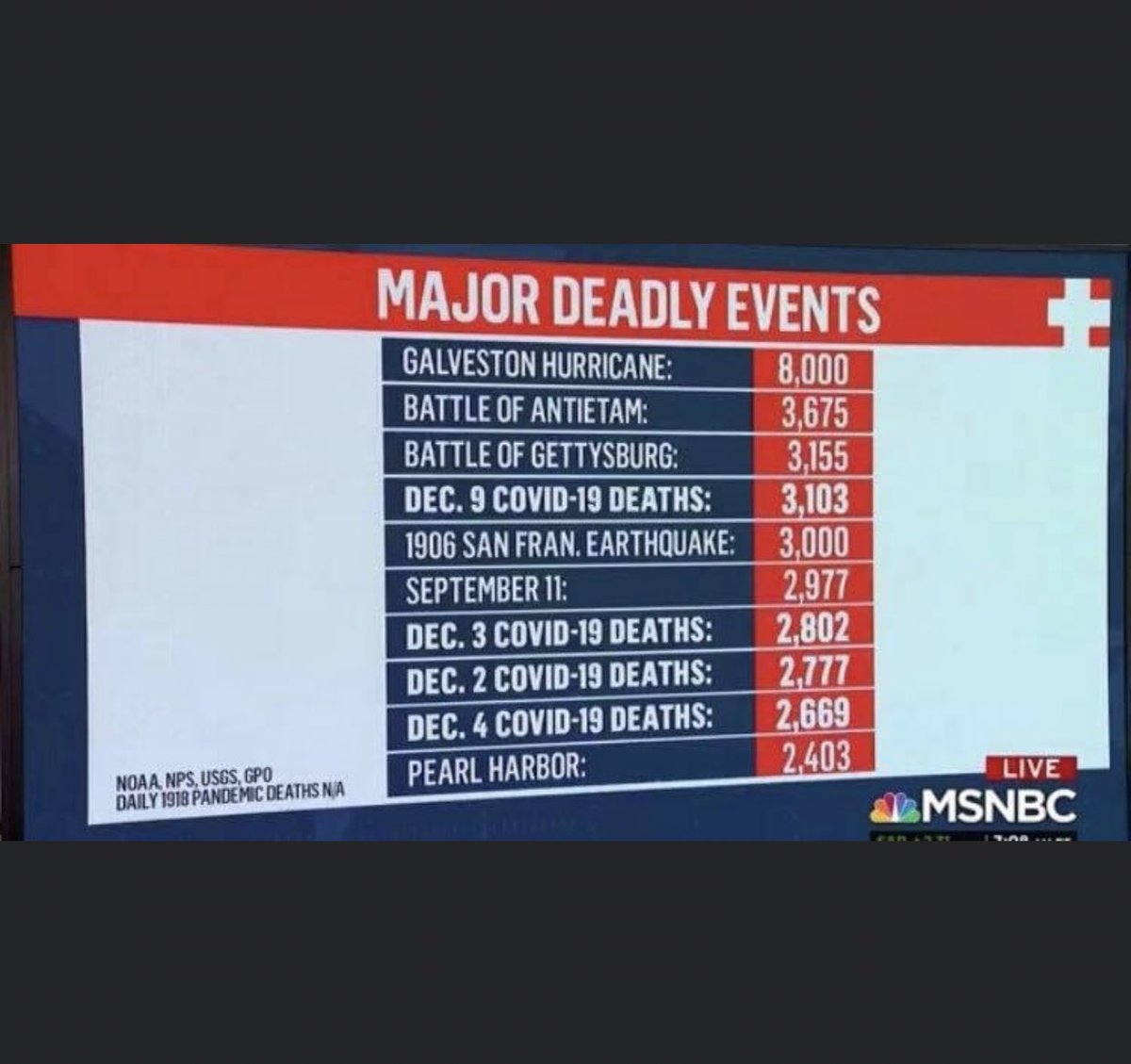
I appreciate the point of this graphic and I do not want to in anyway minimize the horrific number of COVID deaths however... we have got to talk about where y’all pull death toll numbers from and how yall choose which events to include... 🤦🏼♀️👀 

Okay, real quick because this is a learning opportunity.
Comparing death tolls between war, terrorism, pandemics, and acute disaster/ catastrophes is wildly problematic but let’s say you want to do that, fine but there are some things to be aware of…
Comparing death tolls between war, terrorism, pandemics, and acute disaster/ catastrophes is wildly problematic but let’s say you want to do that, fine but there are some things to be aware of…
First, it is notoriously difficult (if not impossible) to get accurate death tolls for these large-scale events. I wrote about some of the issues here (this is all like x10 for events that are now 100 years old, but sure) disaster-ology.com/home/2018/6/4/…
Here’s an example: The Galveston death toll is estimated to be between 6,000 and 12,000. The 8,000 number comes from this research which, again, fine but also not exactly conclusive: galvestonhistorycenter.org/digitized-coll…
The most glaring omission on this list is, um, the 1918 pandemic…
I couldn’t find a daily breakdown and I suspect one doesn’t exist because, again, death tolls are difficult to figure out. However, the CDC says 195,000 Americans died of influenza during October 1918.
You can do your own math there…
cdc.gov/flu/pandemic-r…
You can do your own math there…
cdc.gov/flu/pandemic-r…
Hurricane Maria is another pretty glaring omission. Again, complicated death toll and you can argue about technicalities related to the word “day” but also… come the hell on.
The Okeechobee hurricane of 1928 could also make this list depending on which death toll you use.
The Okeechobee hurricane of 1928 could also make this list depending on which death toll you use.
We are trying to get better at this, btw. One thing that came out of the horrific process of establishing the death toll after Hurricane Maria was this report:
https://twitter.com/SamLMontano/status/1304056769656758274
(There seem to be a few war-related events missing from here like D Day but that's not my area of expertise so I'll skip that.)
Look, using history as a way to understand a current crisis is a natural thing to do. (I’ve done it!) But, you should also be careful about the context of that data. Comparing one disaster to another can lead down some bad paths. Erasure is a huge issue.
https://twitter.com/SamLMontano/status/1245338326254653442
What matters most right now is that WAY too many people have died of COVID largely because of the approach government (specifically the white house and republican governors) has taken to “managing” the pandemic. This did not have to happen.
I — MSNBC, wyd??
To be fair this is, in fact, a list of “major deadly events”.
I don’t have the audio for this graphic so idk the full context but.... 🥴
To be fair this is, in fact, a list of “major deadly events”.
I don’t have the audio for this graphic so idk the full context but.... 🥴

Look, I don't have super high expectations for a viral graphic that some random person made on the internet but this one I'm mad about.
Truly, even if you're just picking some major deadly events how do you not put Maria on there...the constant erasure is just constant & unreal.
Truly, even if you're just picking some major deadly events how do you not put Maria on there...the constant erasure is just constant & unreal.
One more thing and then I stop (sorry). Since SanFran 1906 is on here. Let me just point out this is the perfect example of disputed death tolls. The official total was around 450 and was revised on the *100 year anniversary* to 3,000 which many still believe is an underestimate.
• • •
Missing some Tweet in this thread? You can try to
force a refresh




